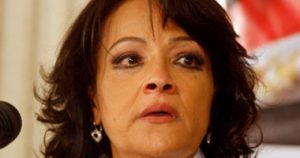By MEMRI–
On July 23, 2019, a video was circulated on social media documenting a meeting between Egyptian Immigration Minister Nabila Makram and members of the Egyptian community in Canada, in which the minister castigated Egyptians who live abroad and criticize Egypt. She said: “We have no country other than Egypt, and we can’t bear [hearing anyone say] a single word against it abroad… What will happen to someone who speaks against our country abroad? [His head] will be chopped off.” [1]
The audience responded to the last remark, which was accompanied by a throat-slitting gesture, with laughter and applause, but Western media and Egyptian media opposed to the regime perceived it as a threat against Egyptian oppositionists living abroad, and condemned it.[2] Among the critics was Alaa Mubarak, the son of the deposed president Hosni Mubarak, who responded with a tweet calling the minister’s statement “irresponsible.” His tweet in turn evoked an angry reaction from the Egyptian daily Al-Yawm Al-Sabi’, which published several reports and articles accusing Alaa Mubarak of having ties with the Egyptian Muslim Brotherhood (MB).[3]
Following the furor over her statement, Nabila Makram hurried to issue a clarification, in which she expressed sorrow over the circulation of the video and claimed that her words had been taken out of context. “The [Egyptian] state does not threaten its sons [living abroad],” she added, “but maintains ties with them and supports them.”[4]
This explanation did not satisfy everyone, however. In her August 1, 2019 column in the daily Al-Masri Al-Yawm, journalist Karima Kamal slammed the minister for her remark, saying that it reflected the excessive sensitivity in Egypt to any word of criticism against the homeland. This touchiness and intolerance, she said, stems from the regime’s struggle against the MB, but has grown beyond all proportion, to the point where all dissent is stifled and any Egyptian who voices criticism, even well-intentioned, is accused of hatred and hostility towards his homeland.

The following are excerpts from her column:[5]
“The minister’s explanation [of her remark] may be genuine, and it’s possible she did not intend [to say] that oppositionists ought to be butchered, as her words implied. The truth is that the minister’s statement exposed something completely different, namely the intensity of [our] love for the homeland and [our] sense of patriotism. For the minister spoke lovingly of Egypt, saying that we have no other homeland and that, because of our great love for it, we can’t stand [hearing] a single word against it. This sense of love [for the homeland] has been intensified lately [by the regime and the pro-regime media], to the point where an Egyptian who truly loves his country cannot bear [hearing] a word against it, because this love is very great and the state must not be harmed…
“However, we must ask ourselves… why an Egyptian who loves his homeland thinks that he is the only one who loves it and that some other Egyptian hates it just because he voiced some criticism or complaint. The Egyptian who voices criticism may [in fact] love his country more, which is why he objects to violations and negative phenomena [that occur in it. In other words,] he voices criticism out of love [for Egypt], not out of hate [for it]… Conversely, the one who feels excessive, irrational and almost hysterical love [for Egypt] refuses to accept criticism from others and thus behaves as though the country belongs to him alone and not to others… But [Egypt] is not his alone; it belongs to all Egyptians. This excessive love causes people [to regard] the homeland as their private property and to go too far in protecting it from others, to the point of expressing hatred for anyone who says… a single word against it, even if it was only a word of criticism, not of hatred…
“Lately there has been a profound confusion over [the meaning of] love for the homeland, accompanied by excessive defensiveness in the face of any criticism against the state and a radical sense of patriotism that [causes some Egyptians] to claim a monopoly over the homeland.
I believe that one of the main reasons for this is hatred for the MB, which has created as state of [heightened] support for the homeland, in response to its own hatred [for it] and attempts to harm it. As a result, defending the homeland has become the main [goal], in disregard of the attacker’s identity. Defending the homeland from the MB has come to mean defending it against anyone, even against an Egyptian who loves his homeland and is [only] expressing his opinion.”
[1] Twitter.com/MohamedAJA, July 23, 2019.
[2] Arabi21.com, July 23, 2019; bbc.com/Arabic, July 25, 2019.
[3] Arabi21.com, Al-Yawm Al-Sabi’ (Egypt ), July 27, 2019. It should be mentioned that Mubarak deleted his tweet two days later (Arabi21.com, July 27, 2019).
[4] Al-Dustour (Egypt), July 23, 2019.
[5] Al-Masri Al-Yawm (Egypt), August 1, 2019.
____________________
https://www.memri.org/reports/egyptian-journalist-decries-lack-freedom-speech-country-any-criticism-perceived-hatred




